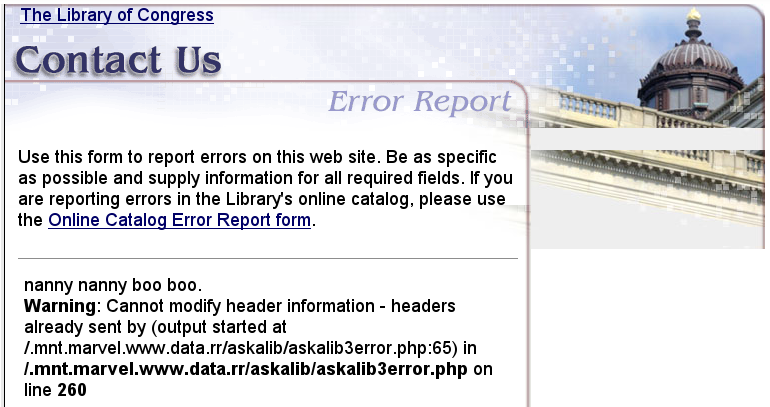
Apparently the US Library of Congress is planning on using Silverlight to deliver it's new website applications:
Browsing the LoC website, I often encounter these links: "Download Free Silverlight Player." When I click them, I get this message: "Your browser may not be supported by Microsoft Silverlight. Please visit http://www.microsoft.com/silverlight/system-requirements.aspx for more information." That page has a list of "Compatible Operating Systems and Browsers", and Linux is not on the list. So I cannot use the Library of Congress's interactive tutorials or other information. Concerned, I wrote this letter to them:
I understand that the Library of Congress is planning a website powered by Microsoft's Silverlight technology, as reported here:
http://www.gcn.com/print/27_2/45710-1.html
As a Linux user, this development worries me. Silverlight is not currently available for Linux, and even if it were I would not install it. Silverlight is a proprietary, undocumented format, and is developed by a company that has a track record of insecure software. Therefore, to view the LoC website with Silverlight, I would have to install software that could potentially make my computer as vulnerable to attack as any Windows computer. That, assuming that Silverlight were even available for Linux, which it is not. Macintosh users are in a similar position. Although Silverlight is available for Macintosh, there is no guarantee of the application's security, and the application could be discontinued at any time (Like IE for Mac was). There are many open, standards-compliant technologies that can power the LoC's website. Many of these technologies are available free of cost, and are better suited to exactly the type of role in which Silverlight is intended to fulfill. In fact, this does not even seem to be an application where Silverlight's distinguishing features are useful.
I urge the Library of Congress to reconsider it's position and to consider other technologies.
This is the page that I got back:
Note the "nanny nanny boo boo" error message. Is that supposed to make me laugh? I don't know if they got my letter or not. All I got was childish mockery and a cryptic error message. Great, I happen to program in PHP so I know what the error was, but I still don't know if my letter was received. As with so many other US government institutions, I feel like giving up on the LoC. They seem so lost, on so many fronts, that trying to help them is not only futile, but will be painful as well. As "con" is obviously the opposite of "pro", we now know why this institution is called the Library of Congress.
Update (2008-02-28): The Director of Communications for the Library of Congress, Matt Raymond, has written me about my concerns. He addresses not only the Silverlight issue, but also the childish error message. I find this interesting, as I did not contact the LoC regarding the error message. Mr. Raymond has speedy informants indeed. If anything new or interesting comes to fruit of our conversation, I will append to this page.
Update (2008-03-05): Apparently the letter that I got from Mr. Raymond was a slightly modified form letter designed to appease those concerned about the Silverlight issue. The response that I got when further questioning the wisdom of the decision was simply the same form letter, without the apology regarding the "nanny nanny boo boo" error message. I present the form letter here:
The Library of Congress relies heavily on annual federal appropriations to carry out our mission of acquiring, preserving and making accessible a universal body of knowledge. In order to better do so, the Library has benefited from hundreds of millions of dollars in private philanthropy over the last two decades.
The Library works with a broad range of companies, including Microsoft competitors, that produce both commercial and open-source applications to make the Library’s collections more broadly accessible, and we welcome the participation of all who share our goals and vision of a more enlightened citizenry.
Providing the kind of seamless interactivity both in the Thomas Jefferson Building and online that will inspire learning and critical thinking is what sets the Library of Congress Experience apart from previous Library ventures and from undertakings at other cultural institutions. Our technology partnerships are crucial to breathing life into this wealth of knowledge and to providing the immersive experience that will allow visitors to touch history as never before.
While the Microsoft contribution to the new Library of Congress Experience is significant, the experience also uses a variety of commercial and open-source technologies from several other companies. I would note and emphasize that the main focus of the agreement is on the on-site experience for visitors and the myloc.gov Web site, not the overall loc.gov site.
From the last sentence it is clear that all website visitors are welcome to the loc.gov website, in contrast to the myloc.gov site which is for Microsoft Windows users only.
Date Published: 2008-02-25
Date Revised: 2008-02-28 (update regarding Matt Raymond's email)
Date Revised: 2008-03-05 (update regarding Matt Raymond's email)